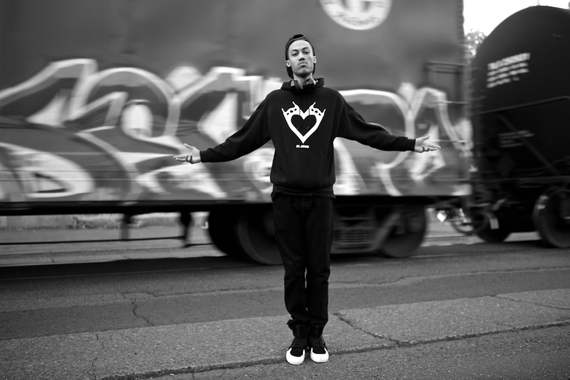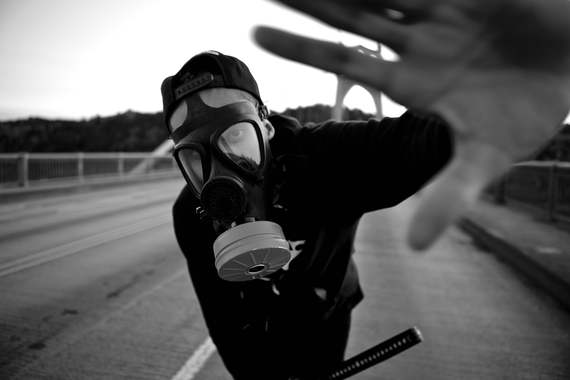Glenn Waco is a hip hop artist from a small town in the northern quadrant of Portland, St John's. He began rapping as a coping mechanism when his grandmother became paralyzed, and Waco says that rapping has always been a "therapeutic process" for him. In 2013 Waco dropped his first album "NorthBound" which was a critically acclaimed local album and as member of The Resistance hip hop collective with Rasheed Jamal and Mic Capes, Waco became a foremost hip hop artist for our generation of Portland rap artist. In 2014 Waco put his music on hold and became heavily involved in activism after Darren Wilson's acquittal in Ferguson. He has worked fearlessly with his mentor and founder of Don't Shoot PDX Teressa Raiford and has emerged as one of the youngest, and most powerful community leaders in Portland. I have had the privilege of working with the musical genius as well as social justice warrior, Glenn Waco, and sat down with him to talk briefly about his first single, Assata, and his upcoming album "Human."
Grace Wong: Why Assata? Why now? (For those unfamiliar with the case, Assata Shakur was a Black Panther and member of the Black Liberation Army who was convicted for a series of crimes between 1971 and 1973, but was most known for being shot with her hands up in a shootout between herself and the New Jersey State Troopers in '73. She was incarcerated in a series of prisons, but in 1979 escaped from prison to Cuba where she received political asylum and has been living since. n 2013 she became the first woman to on the FBI Most Wanted Terrorist Watch List. Along with the FBI price, the New Jersey Attorney General matched the reward for her capture: $2 million. Black Lives Matter has taken this instance of a black woman being shot with her hands up as a powerful image to inspire change within racist police bureaus and as a call to end police brutality towards black and brown community members)
Glenn Waco: The events that occurred in the 1970s directly connect to what we're going through now in 2016 so I wanted to reach back and connect the dots to the present in order to gain clarity about what's going on right now.
A 1993 report was just recently unearthed in which a former Nixon aide John Ehrlichman revealed that the War on Drugs was started to criminalize black people. Around the same time there was a government effort to dismantle and neutralize black nationalist movements through the FBI counter-intelligence program (COINTELPRO). According to the program's founder J. Edgar Hoover, the program was founded out of fear of a black messiah, someone who could unify these organizations. In a post MLK & Malcolm, a lot of Black Panthers lived in exile or were imprisoned on false charges.
Assata Shakur's case sounds like it could have happened in 2016. In short she was shot with her hands up, accused of killing a New Jersey state trooper even though forensic evidence proved she never touched a gun and medical evidence proved she was physically incapable of lifting her arm to shoot a gun in the first place. She was then chained to her hospital bed, tortured by police officers, spent years of solitary confinement in men's prisons and was convicted by a proven racist all-white jury but to this day those details are ignored and she's the one labeled a terrorist.
Assata Shakur is turning 70 soon, she's Tupac's godmother and a political refugee not a terrorist. I want to help spread awareness about her case so that she can live the rest of her life out in peace.
Grace Wong: What was your inspiration behind "Human"?
Glenn Waco: This struggle that we're going through is nothing new. What separates American slavery from others is the fact that black slaves were viewed as being sub-human. There's entire sciences based on the pain, suffering and trauma of black women stemming from experiments on slaves that we practice to this day. Black people in America have been fighting for human rights since before we set foot on American soil.
9 million+ died on the slave ships heading here alone. This isn't a civil rights issue, it has to be recognized as a human issue because it's not only our civil liberties being violated we're being told when, where, how and why we are allowed to exist and occupy spaces. We're not only being denied civil rights, we're being denied the right to be human beings.
Grace Wong: There are so many issues to care about. Further, you have music to be making. Why do you care about and devote so much time to social justice issues?
Glenn Waco: Social justice has roots of threatening my right to exist as a black man in America. The first slaves arrived here in Jamestown 1619, the United States of America was founded in 1776. Today The KKK are not categorized as a terrorist organization but currently conservatives are pushing for Black Lives Matter to be labeled as a terrorist organization. There's a presidential candidate whose supported by the KKK, Neo Nazis and other white supremacist organizations openly. 73% of police murders are committed by white males yet all you hear about is how officers need to fear black men. 2015 was the safest year for police officers since the 1980's yet we're to believe there's a 'War on Cops'
In retrospect according to the research that's been conducted, police officers have killed 700+ so far this year and if we're to compare national averages according to the Bureau of Justice, American police officers kill an average of 930 people per year, Canadian police 25, Germany 8, Australia 5 and the United Kingdom 2.
Where is the war on dissension from oppression in this country with Black, Latino, and Native Americans bearing the brunt of the war?
Human rights are being violated, that violation has gone unchecked for quite some time. If we're to ever progress, we must talk about the cause of systemic oppression rather than zoning in on the effects such as gang violence and mitigate the root of the problems.
Grace Wong: What has been an unforgettable moment in your activism work?
Glenn Waco: The night of our first and biggest protests- I was between a line of police and everyone else, hundreds of people. It had come to a halt and as I was motioning everyone to turn back around and continue on route, the police in full militarized uniforms targeted me with flash-bang grenades right at my feet. I will never forget that.
On another occasion me and Marcus Cooper, another Don't Shoot PDX activist, saved a kid's life after a drive-by shooting at a parade in Portland called Last Thursday. After saving this kid, we surrounded by police and nearly murdered ourselves. The icing on the cake was being slandered by the local media in spite of being heroes. The positive side to all of this is I've had the blessing of influencing a lot of change and inspiring a lot of people to wake up and get proactive rather than reactive.
I've spoken at colleges and have had college professors write essays on me, my music & words but what I value most is being able to go into schools and hearing our own children speaking on really advanced topics such as the prison industrial complex. The future is not so grim if our children are enlightened.

